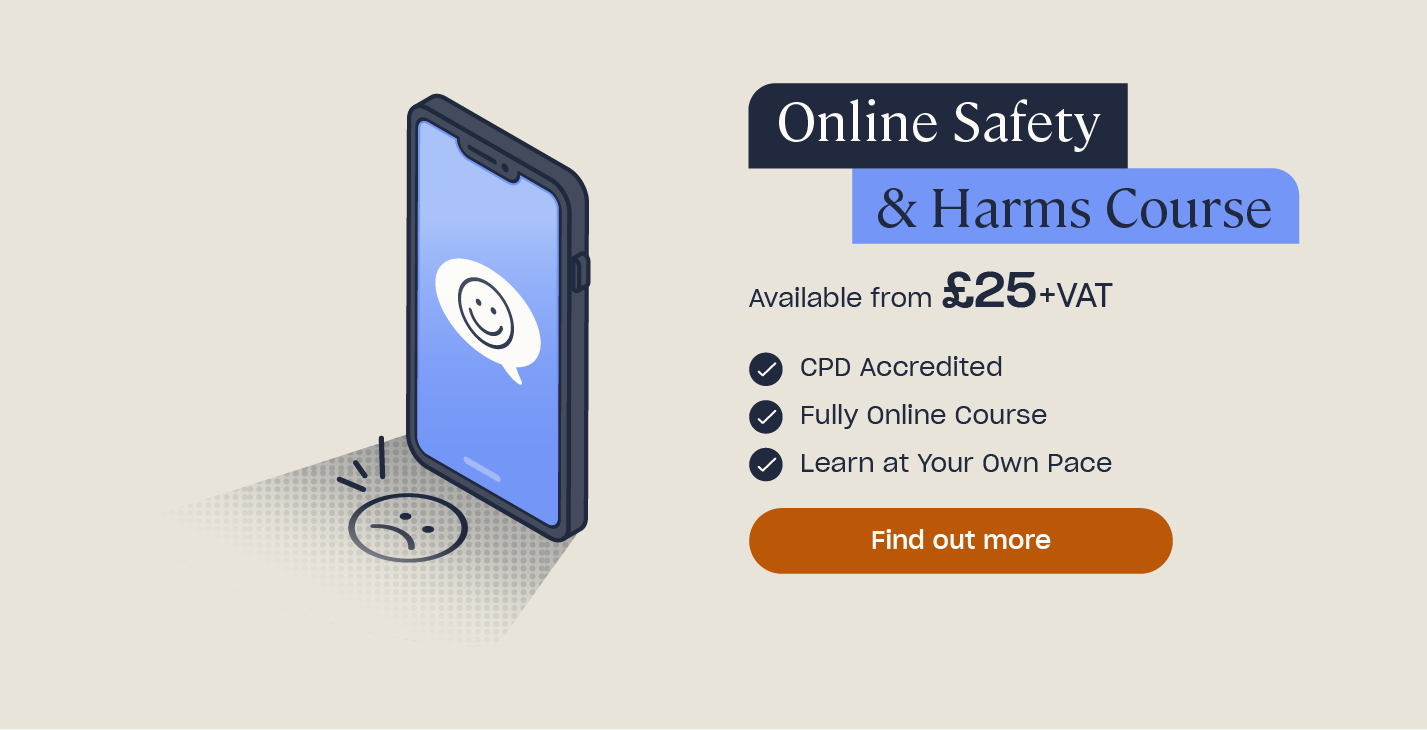Mobile Phones in Schools Debate: Advantages and Disadvantages
Children of today are born into a digital world and develop digital literacy skills that are far more advanced than their parents and teachers. These digital skills can be incredibly useful in the classroom and devices can be used to assist education in a positive way. However, using devices – like mobile phones – in schools can also have many disadvantages and it is a topic that’s constantly up for debate.
In this article, we’ll look more at the mobile phones in schools debate, outlining a few of the advantages of mobile phones in the classroom as well as some of the disadvantages, particularly from a safeguarding children perspective.
Mobile Phone Policy: Free Template
Looking to establish a Mobile Phone Policy in your school? Take a look at our guidance on how to go about this and download our free Mobile Phone Policy Template.
Mobile Phones in Schools
Safeguarding children and young people in schools is an essential responsibility of all adults, not just teachers and parents. The use of mobile phones in schools is a hot topic and one that’s closely linked to safeguarding, which is why the UK government has recently issued guidance for secondary schools on how and why they should prohibit the use of mobile phones in school.
The guidance doesn’t call for an outright ban of mobile phones in schools, but it does recommend that they are discouraged. Many schools already have rules in place that prevent students from using mobile phones during school hours, as they can prevent an unnecessary distraction from education, so this guidance won’t come as a surprise.

Consider the following statistics about the use of mobile phones in schools:
- Ofcom found that 97% of children own a mobile phone by the age of 12.
- Ofcom also discovered that 63% of 8-11-year-olds and 93% of 12-15-year-olds use social media and messaging apps.
- The National Behaviour Survey found that 29% of secondary school pupils say that mobile phones are used without permission in most of their lessons.
- The ONS tells us that one in five children have experienced online bullying.
- The RCPCH found that screen time displaces activities which have a positive impact on wellbeing, such as socialising, sleep and exercise.
- Mobile phones have already been prohibited or restricted in one in four countries worldwide.
Should Phones Be Allowed in School?
Despite the concerns, there are some real advantages of children having their mobile phones in the classroom. This side of the debate isn’t the most popular one, but here are five positive reasons why phones should be allowed in school:
- For digital learning – mobile phones can be used to enhance a child’s education if they’re used in the right way. For example, certain apps and games can all be used to teach topics and encourage creative thinking. These methods are particularly beneficial for those with special educational needs.
- For research in lessons – mobile phones offer students access to the internet and therefore a wealth of information. Phones can be used in the classroom to support learning by using them as a research tool when doing projects or coursework.
- For medical reasons – some children need access to their mobile phone to support their health, such as to keep track of their medicine schedule or monitor their diabetes.
- For internal communication – mobile phones enable a quick and easy way for the school to communicate information to students, whether it’s about changes to schedules, health and safety information or weekly notices. This information can be emailed or texted to each child and reduces the need for paper letters.
- For caring responsibilities – young carers are likely to need regular contact with the family member they care for in case of emergency, so having a mobile phone in the classroom enables them to be contactable at all times.

Should Mobile Phones Be Banned in Schools?
The disadvantages of children having phones in school are numerous and this is why the UK Government has issued guidance that suggests schools prohibit the use of mobile phones in the classroom. Here are five reasons why mobile phones should be banned in schools:
- Phones are distracting – social media notifications, apps and games all distract children from their education and can cause endless disruptions to lessons. In turn, this can mean students struggle to focus, teachers become distracted and academic performance is reduced.
- Phones can lead to bullying – bullying carried out via social media or the internet is known as cyberbullying and it can have devastating effects on a child’s mental health. Using a mobile phone at school may make cyberbullying more prevalent, as students are always online and therefore always vulnerable to online harassment by other students.
- Phones make children vulnerable to abuse – the exploitation and abuse of children via the internet and social media is a serious problem, as it gives abusers direct, 24/7 access to children away from adults. All children should be educated in internet safety and the associated risks to help keep them safe from harm.
- Phones cause health problems – excessive mobile phone use can cause various health issues, from eye strain and neck problems to disrupted sleep and anxiety. If students use their mobile phones during break times, it’s also likely to lead to reduced physical activity.
- Phones impact wellbeing – spending more time on a mobile phone means spending less time socialising face-to-face with classmates, which has an adverse effect on overall wellbeing. Students should be encouraged to play, exercise and socialise during breaks instead of scrolling on their phones.
Looking to Learn More?
Whilst mobile phones can be highly beneficial for children, they can also contribute towards poor mental health and wellbeing. Understanding children’s mental health is essential for all teachers: High Speed Training’s online Child Mental Health course will help you learn more and understand how to better support the pupils in your classroom.
Tips for Managing Mobile Phones in the Classroom
If your school has chosen to prohibit or minimise the use of mobile phones in the classroom, the following tips will help you to manage and enforce a no-phone zone:
- Highlight the benefits of reducing screen time with posters, educational activities and awareness days. If children can recognise why screen-free time is important and how it will benefit them, then they’re more likely to agree to put their phone away.
- Educate students on online safety, including how to use social media safely, setting strong passwords, using privacy settings, taking care when gaming online and how to report inappropriate or offensive content. Making children aware of the dangers will not only help safeguard them from harm but also discourage phone use.
- Promote the use of mobile phones as educational tools, rather than for socialising or gaming which are more likely to be disruptive distractions. Mobile phones can become a positive part of the learning experience if they’re used within the curriculum.
- Create designated ‘no-phone-zones’ where mobile phones must never be used, such as in the classroom, in the lunch hall and in the playground. Make tech-free zones a normal part of the school day.
- Ensure your school has a mobile phone policy that clearly states when and where mobile phones can and can’t be used by students. Make sure the policy is communicated to all pupils and actively enforced, or else its demands will be ignored.
- Work with parents to set mobile phone boundaries at home as well as in school. Parents also need to be educated in online safety and the risks associated with the internet and social media if mobile phone use is to be reduced. Teach parents about the benefits of phone-free time and why managing mobile phone use is important for safeguarding their children from harm.
The mobile phones in schools debate is an ongoing conversation that needs to involve everyone affected, including teachers, students and their parents. Whilst there are many advantages to being able to use a mobile phone at school, there are also many disadvantages, particularly when it comes to child protection concerns. Prohibiting mobile phones in schools may not be the answer but it’s clear that there are many benefits to reducing children’s screen time.
Further Resources:
- Online Safety & Harms
- Screen Time for Children: Advice for Parents
- Internet Safety Posters for Schools
- Why is Cyberbullying Harmful and What Actions Can You Take?
- How to Explain Internet Safety to a Child
- Online Safety and Harms Quiz
- The Importance of Teaching Social Media Safety in Schools











